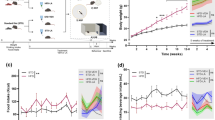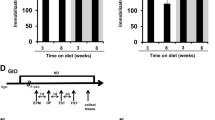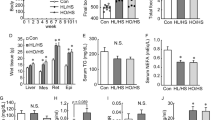Abstract
Objective
Obesity significantly elevates the odds of developing mood disorders. Chronic consumption of a saturated high-fat diet (HFD) elicits anxiodepressive behavior in a manner linked to metabolic dysfunction and neuroinflammation in mice. Dietary omega-3 polyunsaturated fatty acids (n-3 PUFA) can improve both metabolic and mood impairments by relieving inflammation. Despite these findings, the effects of n-3 PUFA supplementation on energy homeostasis, anxiodepressive behavior, brain lipid composition, and gliosis in the diet-induced obese state are unclear.
Methods
Male C57Bl/6J mice were fed a saturated high-fat diet (HFD) or chow for 20 weeks. During the last 5 weeks mice received daily gavage (“supplementation”) of fish oil (FO) enriched with equal amounts of docosahexaenoic (DHA) and eicosapentaenoic acid (EPA) or control corn oil. Food intake and body weight were measured throughout while additional metabolic parameters and anxiety- and despair-like behavior (elevated-plus maze, light–dark box, and forced swim tasks) were evaluated during the final week of supplementation. Forebrain lipid composition and markers of microglia activation and astrogliosis were assessed by gas chromatography–mass spectrometry and real-time PCR, respectively.
Results
Five weeks of FO supplementation corrected glucose intolerance and attenuated hyperphagia in HFD-induced obese mice without affecting adipose mass. FO supplementation also defended against the anxiogenic and depressive-like effects of HFD. Brain lipids, particularly anti-inflammatory PUFA, were diminished by HFD, whereas FO restored levels beyond control values. Gene expression markers of brain reactive gliosis were supressed by FO.
Conclusions
Supplementing a saturated HFD with FO rich in EPA and DHA corrects glucose intolerance, inhibits food intake, suppresses anxiodepressive behaviors, enhances anti-inflammatory brain lipids, and dampens indices of brain gliosis in obese mice. Together, these findings support increasing dietary n-3 PUFA for the treatment of metabolic and mood disturbances associated with excess fat intake and obesity.
This is a preview of subscription content, access via your institution
Access options
Subscribe to this journal
Receive 12 print issues and online access
$259.00 per year
only $21.58 per issue
Buy this article
- Purchase on Springer Link
- Instant access to full article PDF
Prices may be subject to local taxes which are calculated during checkout




Similar content being viewed by others

References
Gariepy G, Nitka D, Schmitz N. The association between obesity and anxiety disorders in the population: a systematic review and meta-analysis. Int J Obes. 2010;34:407–19.
Faith MS, Butryn M, Wadden TA, Fabricatore A, Nguyen AM, Heymsfield SB. Evidence for prospective associations among depression and obesity in population-based studies. Obesity Rev. 2011;12:e438–53.
Mannan M, Mamun A, Doi S, Clavarino A. Prospective associations between depression and obesity for adolescent males and females—a systematic review and meta-analysis of longitudinal studies. PLoS ONE. 2016;11:e0157240.
Luppino FS, de Wit LM, Bouvy PF, Stijnen T, Cuijpers P, Penninx BW, Zitman FG. Overweight, Obesity, and Depression: A Systematic Reviewand Meta-Analysis of Longitudinal Studies. Arch Gen Psychiatry. 2010;67:220–9.
Capuron L, Lasselin J, Castanon N. Role of adiposity-driven inflammation in depressive morbidity. Neuropsychopharmacology. 2017;42:115–28.
Hryhorczuk C, Sharma S, Fulton SE. Metabolic disturbances connecting obesity and depression. Front Neurosci. 2013;7:177.
Lee ES, Kim YH, Beck SH, Lee S, Oh SW. Depressive mood and abdominal fat distribution in overweight premenopausal women. Obes Res. 2005;13:320–5.
Milaneschi Y, Simonsick EM, Vogelzangs N, Strotmeyer ES, Yaffe K, Harris TB, et al. Leptin, abdominal obesity, and onset of depression in older men and women. J Clin Psychiatry. 2012;73:1205–11.
Sharma S, Fulton S. Diet-induced obesity promotes depressive-like behaviour that is associated with neural adaptations in brain reward circuitry. Int J Obes. 2013;37:382–9.
Yamada N, Katsuura G, Ochi Y, Ebihara K, Kusakabe T, Hosoda K, et al. Impaired CNS leptin action is implicated in depression associated with obesity. Endocrinology. 2011;152:2634–43.
Tchernof A, Despres JP. Pathophysiology of human visceral obesity: an update. Physiol Rev. 2013;93:359–404.
Santos S, Oliveira A, Lopes C. Systematic review of saturated fatty acids on inflammation and circulating levels of adipokines. Nutr Res. 2013;33:687–95.
Decarie-Spain L, Sharma S, Hryhorczuk C, Issa-Garcia V, Barker PA, Arbour N, et al. Nucleus accumbens inflammation mediates anxiodepressive behavior and compulsive sucrose seeking elicited by saturated dietary fat. Mol Metab. 2018;10:1–13.
Lai JS, Oldmeadow C, Hure AJ, McEvoy M, Hiles SA, Boyle M, et al. Inflammation mediates the association between fatty acid intake and depression in older men and women. Nutr Res. 2016;36:234–45.
Chan KL, Cathomas F, Russo SJ. Central and peripheral inflammation link metabolic syndrome and major depressive disorder. Physiology. 2019;34:123–33.
Lassale C, Batty GD, Baghdadli A, Jacka F, Sanchez-Villegas A, Kivimaki M. et al. Healthy dietary indices and risk of depressive outcomes: a systematic review and meta-analysis of observational studies. Mol Psychiatry. 2019;24:965–86 .
Li K, Huang T, Zheng J, Wu K, Li D. Effect of marine-derived n-3 polyunsaturated fatty acids on C-reactive protein, interleukin 6 and tumor necrosis factor alpha: a meta-analysis. PLoS One. 2014;9:e88103.
Gao H, Geng T, Huang T, Zhao Q. Fish oil supplementation and insulin sensitivity: a systematic review and meta-analysis. Lipids Health Dis. 2017;16:131.
Zemdegs J, Rainer Q, Grossmann CP, Rousseau-Ralliard D, Grynberg A, Ribeiro E, et al. Anxiolytic- and antidepressant-like effects of fish oil-enriched diet in brain-derived neurotrophic factor deficient mice. Front Neurosci. 2018;12:974.
Laye S, Nadjar A, Joffre C, Bazinet RP. Anti-inflammatory effects of omega-3 fatty acids in the brain: physiological mechanisms and relevance to pharmacology. Pharmacol Rev. 2018;70:12–38.
Dang R, Zhou X, Tang M, Xu P, Gong X, Liu Y, et al. Fish oil supplementation attenuates neuroinflammation and alleviates depressive-like behavior in rats submitted to repeated lipopolysaccharide. Eur J Nutr. 2018;57:893–906.
Grosso G, Micek A, Marventano S, Castellano S, Mistretta A, Pajak A, et al. Dietary n-3 PUFA, fish consumption and depression: a systematic review and meta-analysis of observational studies. J Affect Disord. 2016;205:269–81.
Grosso G, Pajak A, Marventano S, Castellano S, Galvano F, Bucolo C, et al. Role of omega-3 fatty acids in the treatment of depressive disorders: a comprehensive meta-analysis of randomized clinical trials. PLoS ONE. 2014;9:e96905.
Deacon G, Kettle C, Hayes D, Dennis C, Tucci J. Omega 3 polyunsaturated fatty acids and the treatment of depression. Crit Rev Food Sci Nutr. 2017;57:212–23.
Auguste S, Sharma S, Fisette A, Fernandes MF, Daneault C, Des Rosiers C, et al. Perinatal deficiency in dietary omega-3 fatty acids potentiates sucrose reward and diet-induced obesity in mice. Int Soc Dev Neurosci. 2018;64:8–13.
Mathieu G, Denis S, Lavialle M, Vancassel S. Synergistic effects of stress and omega-3 fatty acid deprivation on emotional response and brain lipid composition in adult rats. Prostaglandins Leukot Essent Fatty Acids. 2008;78:391–401.
Innis PMK-EaS. Position of the american dietetic association and dietitians of canada: dietary fatty acids. J Am Dietetic Association. 2007;107:1599.e1–15.
Nair AB, Jacob S. A simple practice guide for dose conversion between animals and human. J Basic Clin Pharm. 2016;7:27–31.
Gelinas R, Thompson-Legault J, Bouchard B, Daneault C, Mansour A, Gillis MA, et al. Prolonged QT interval and lipid alterations beyond beta-oxidation in very long-chain acyl-CoA dehydrogenase null mouse hearts. Am J Physiol Heart Circ Physiol. 2011;301:H813–23.
Turcot V, Brunet J, Daneault C, Tardif JC, Des Rosiers C, Lettre G. Validation of fatty acid intakes estimated by a food frequency questionnaire using erythrocyte fatty acid profiling in the Montreal Heart Institute Biobank. J Hum Nutr Dietetics. 2015;28:646–58.
Thompson JA, Larion S, Mintz JD, Belin de Chantemele EJ, Fulton DJ, Stepp DW. Genetic deletion of NADPH oxidase 1 rescues microvascular function in mice with metabolic disease. Circ Res. 2017;121:502–11.
Howe P, Buckley J. Metabolic health benefits of long-chain omega-3 polyunsaturated fatty acids. Military Med. 2014;179:138–43.
Thesing CS, Bot M, Milaneschi Y, Giltay EJ, Penninx B. Omega-3 and omega-6 fatty acid levels in depressive and anxiety disorders. Psychoneuroendocrinology. 2018;87:53–62.
Belzung F, Raclot T, Groscolas R. Fish oil n-3 fatty acids selectively limit the hypertrophy of abdominal fat depots in growing rats fed high-fat diets. Am J Physiol. 1993;264:R1111–8.
Huang XF, Xin X, McLennan P, Storlien L. Role of fat amount and type in ameliorating diet-induced obesity: insights at the level of hypothalamic arcuate nucleus leptin receptor, neuropeptide Y and pro-opiomelanocortin mRNA expression. Diabetes Obes Metab. 2004;6:35–44.
Burdge GC, Calder PC. Dietary alpha-linolenic acid and health-related outcomes: a metabolic perspective. Nutr Res Rev. 2006;19:26–52.
Oliveira V, Marinho R, Vitorino D, Santos GA, Moraes JC, Dragano N, et al. Diets Containing alpha-linolenic (omega3) or Oleic (omega9) fatty acids rescues obese mice from insulin resistance. Endocrinology. 2015;156:4033–46.
Kasbi Chadli F, Andre A, Prieur X, Loirand G, Meynier A, Krempf M, et al. n-3 PUFA prevent metabolic disturbances associated with obesity and improve endothelial function in golden Syrian hamsters fed with a high-fat diet. Br J Nutr. 2012;107:1305–15.
Oh DY, Talukdar S, Bae EJ, Imamura T, Morinaga H, Fan W, et al. GPR120 is an omega-3 fatty acid receptor mediating potent anti-inflammatory and insulin-sensitizing effects. Cell. 2010;142:687–98.
Datilo MN, Sant’Ana MR, Formigari GP, Rodrigues PB, de Moura LP, da Silva ASR, et al. Omega-3 from Flaxseed Oil Protects Obese Mice Against Diabetic Retinopathy Through GPR120 Receptor. Sci Rep. 2018;8:14318.
Lopez-Alarcon M, Inda-Icaza P, Marquez-Maldonado MC, Armenta-Alvarez A, Barbosa-Cortes L, Maldonado-Hernandez J. A randomized control trial of the impact of LCPUFA-omega3 supplementation on body weight and insulin resistance in pubertal children with obesity. Pediatr Obes. 2019;14:e12499.
Helland A, Bratlie M, Hagen IV, Mjos SA, Sornes S, Ingvar Halstensen A, et al. High intake of fatty fish, but not of lean fish, improved postprandial glucose regulation and increased the n-3 PUFA content in the leucocyte membrane in healthy overweight adults: a randomised trial. Br J Nutr. 2017;117:1368–78.
Rodriguez-Navas C, Morselli E, Clegg DJ. Sexually dimorphic brain fatty acid composition in low and high fat diet-fed mice. Mol Metab. 2016;5:680–9.
Hryhorczuk C, Florea M, Rodaros D, Poirier I, Daneault C, Des Rosiers C, et al. Dampened mesolimbic dopamine function and signaling by saturated but not monounsaturated dietary lipids. Neuropsychopharmacology. 2016;41:811–21.
Tsuboi H, Watanabe M, Kobayashi F, Kimura K, Kinae N. Associations of depressive symptoms with serum proportions of palmitic and arachidonic acids, and alpha-tocopherol effects among male population–a preliminary study. Clin Nutr. 2013;32:289–93.
Holman HMaRT. Alteration of the fatty acid composition of brain lipids by varying levels of dietary essential fatty acids. J Neurochem. 1963;10:523–30.
Naliwaiko K, Araujo RL, da Fonseca RV, Castilho JC, Andreatini R, Bellissimo MI, et al. Effects of fish oil on the central nervous system: a new potential antidepressant? Nutr Neurosci. 2004;7:91–9.
Chen CT, Bazinet RP. beta-oxidation and rapid metabolism, but not uptake regulate brain eicosapentaenoic acid levels. Prostaglandins Leukot Essent Fatty Acids. 2015;92:33–40.
Su KP, Lai HC, Yang HT, Su WP, Peng CY, Chang JP, et al. Omega-3 fatty acids in the prevention of interferon-alpha-induced depression: results from a randomized, controlled trial. Biol Psychiatry. 2014;76:559–66.
Dantzer R, O’Connor JC, Freund GG, Johnson RW, Kelley KW. From inflammation to sickness and depression: when the immune system subjugates the brain. Nat Rev Neurosci. 2008;9:46–56.
Song C, Manku MS, Horrobin DF. Long-chain polyunsaturated fatty acids modulate interleukin-1beta-induced changes in behavior, monoaminergic neurotransmitters, and brain inflammation in rats. J Nutr. 2008;138:954–63.
Lin PY, Huang SY, Su KP. A meta-analytic review of polyunsaturated fatty acid compositions in patients with depression. Biol Psychiatry. 2010;68:140–7.
Gopaldas M, Zanderigo F, Zhan S, Ogden RT, Miller JM, Rubin-Falcone H, et al. Brain serotonin transporter binding, plasma arachidonic acid and depression severity: a positron emission tomography study of major depression. J Affect Disord. 2019;257:495–503.
Delpech JC, Madore C, Joffre C, Aubert A, Kang JX, Nadjar A, et al. Transgenic increase in n-3/n-6 fatty acid ratio protects against cognitive deficits induced by an immune challenge through decrease of neuroinflammation. Neuropsychopharmacology. 2015;40:525–36.
Thaler JP, Yi CX, Schur EA, Guyenet SJ, Hwang BH, Dietrich MO, et al. Obesity is associated with hypothalamic injury in rodents and humans. J Clin Investig. 2012;122:153–62.
Morselli E, Fuente-Martin E, Finan B, Kim M, Frank A, Garcia-Caceres C, et al. Hypothalamic PGC-1alpha protects against high-fat diet exposure by regulating ERalpha. Cell Rep. 2014;9:633–45.
de Mello AH, Schraiber RB, Goldim MPS, Garcez ML, Gomes ML, de Bem Silveira G, et al. Omega-3 fatty acids attenuate brain alterations in high-fat diet-induced obesity model. Mol Neurobiol. 2019;56:513–24.
Auguste S, Fisette A, Fernandes MF, Hryhorczuk C, Poitout V, Alquier T. et al. Central agonism of GPR120 acutely inhibits food intake and food reward and chronically suppresses anxiety-like behavior in mice. Int J Neuropsychopharmacol. 2016;19:1–10.
Acknowledgements
This work was supported by grants from the Natural Sciences and Engineering Research Council of Canada to SF, Merck Sharp Dohme Corp to SF, TA, and CDR and Réseau cardiométabolique, diabète & obésité from Fonds de Recherche Québec-Santé (CMDO-FRQS) to TA and CDR. GD was supported by a FRQS graduate fellowship, JR by a FRQS postdoctoral fellowship, GF by an INRA fund for mobility/sabbatical stay, and SF and TA are supported by FRQS senior salary awards.
Author information
Authors and Affiliations
Consortia
Corresponding author
Ethics declarations
Conflict of interest
The authors declare that they have no conflict of interest.
Additional information
Publisher’s note Springer Nature remains neutral with regard to jurisdictional claims in published maps and institutional affiliations.
Rights and permissions
About this article
Cite this article
Demers, G., Roy, J., Machuca-Parra, A.I. et al. Fish oil supplementation alleviates metabolic and anxiodepressive effects of diet-induced obesity and associated changes in brain lipid composition in mice. Int J Obes 44, 1936–1945 (2020). https://doi.org/10.1038/s41366-020-0623-6
Received:
Revised:
Accepted:
Published:
Issue Date:
DOI: https://doi.org/10.1038/s41366-020-0623-6
This article is cited by
-
Dietary linoleic acid supplementation protects against obesity-induced microglial reactivity in mice
Scientific Reports (2024)
-
Effects of diabetes on microglial physiology: a systematic review of in vitro, preclinical and clinical studies
Journal of Neuroinflammation (2023)
-
Central activation of the fatty acid sensor GPR120 suppresses microglia reactivity and alleviates sickness- and anxiety-like behaviors
Journal of Neuroinflammation (2023)
-
Multi-omics reveal neuroprotection of Acer truncatum Bunge Seed extract on hypoxic-ischemia encephalopathy rats under high-altitude
Communications Biology (2023)
-
Neuroepigenetic Changes in DNA Methylation Affecting Diabetes-Induced Cognitive Impairment
Cellular and Molecular Neurobiology (2023)


